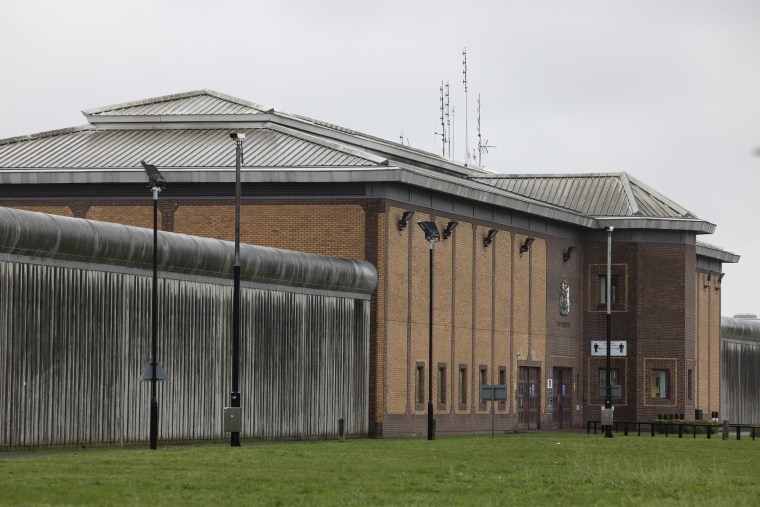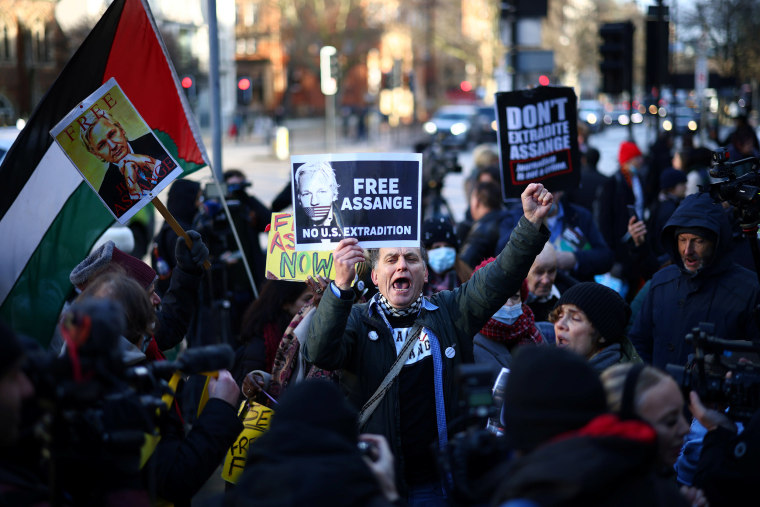LONDON — WikiLeaks founder Julian Assange has been denied bail, a U.K. court ruled on Wednesday, and will remain in prison while lawyers for the U.S. government try to secure his extradition from Britain.
The bail ruling comes just days after the same judge found that Assange could not be legally extradited to the United States to face espionage charges, due to concerns about his mental health and the risk of suicide.
Lawyers for Assange made the case that his mental health could deteriorate if he continued to be separated from his partner and two young children, and cited concerns over the levels of coronavirus in U.K. jails.
District Judge Vanessa Baraitser rejected Assange's lawyers' arguments, and said that his past conduct, including skipping bail in 2012 to avoid proceedings in Sweden and seeking refuge in the Ecuadorian embassy in London, had shown Assange was a flight risk.
"As far as Mr. Assange is concerned this case has not yet been won ... the outcome of this appeal is not yet known," she said. Adding, that Assange had incentives "to abscond," had breached bail in the past and demonstrated a willingness to "flout the orders of this court."
He will now remain incarcerated in a London high security prison while the U.S. Justice Department continues to appeal the decision blocking his extradition.
If the U.S. appeal is ultimately successful and Assange, 49, is extradited to America, he could face a maximum of 175 years in prison there, on 18 charges of breaking an espionage law and conspiring to hack government computers.
WikiLeaks published hundreds of thousands of secret U.S. diplomatic cables that laid bare often critical appraisals of world leaders, including Saudi royals and Russian President Vladimir Putin.
Download the NBC News app for breaking news and politics
Among the files published in 2010 by WikiLeaks was a video of a 2007 Apache helicopter attack by American forces in Baghdad, which killed a dozen people including two Reuters journalists.
Assange has not been out in public since he sought refuge in the Ecuadorian embassy in London in 2012 over U.S. extradition fears. He also sought to avoid extradition to Sweden for sex offense allegations, which were subsequently dropped in 2015.
Assange has been in a London prison since his ejection from the embassy in April 2019.
Supporters hail Assange as an anti-establishment hero, victimized for exposing what they describe as U.S. abuses of power in Afghanistan and Iraq, and see his prosecution as an assault on journalism and free speech.
But detractors cast him as a dangerous figure who has undermined security in the West, and dispute that he is a journalist.
District Judge Baraitser said in her Monday decision that the WikiLeaks founder's activity in 2010 — receiving classified files from U.S. Army intelligence analyst Chelsea Manning — went beyond investigative journalism.

Speaking outside the court after Wednesday's ruling, Assange's partner, Stella Moris with whom he had two children while living in the Ecuadorian embassy, denounced the bail decision.
"This is a huge disappointment," she said. "I urge the Department of Justice to drop the charges and the President of the United States to pardon Julian."
Moris has previously called on both President Donald Trump and President-elect Joe Biden to pardon Assange, and earlier this week told NBC News a pardon would save his life and "save the First Amendment."
On Monday, Mexican President Andres Manuel Lopez Obrador said at a press conference that he would offer political asylum to Assange.
A day later, Australian Prime Minister Scott Morrison told a Sydney radio station 2GB that Assange, an Australian national, was "free to return home," once legal challenges against him were over.
Reuters contributed to this report.
If you or someone you know is in crisis, call the National Suicide Prevention Lifeline at 800-273-8255, text HOME to 741741 or visit www.speakingofsuicide.com for additional resources.

